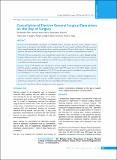Please use this identifier to cite or link to this item:
https://hdl.handle.net/20.500.14356/1259Full metadata record
| DC Field | Value | Language |
|---|---|---|
| dc.contributor.author | Karki, Om Bahadur | - |
| dc.contributor.author | Hazra, Niranjan Kumar | - |
| dc.contributor.author | Timilsina, Bishwodeep | - |
| dc.date.accessioned | 2023-05-04T06:04:16Z | - |
| dc.date.available | 2023-05-04T06:04:16Z | - |
| dc.date.issued | 2020 | - |
| dc.identifier.citation | KarkiO. B., HazraN. K., & TimilsinaB. (2020). Cancellation of Elective General Surgical Operations on the Day of Surgery . Journal of Nepal Health Research Council, 18(2), 201-204. https://doi.org/10.33314/jnhrc.v18i2.1951 | en_US |
| dc.identifier.issn | Print ISSN: 1727-5482; Online ISSN: 1999-6217 | - |
| dc.identifier.uri | http://103.69.126.140:8080/handle/20.500.14356/1259 | - |
| dc.description | Original Article | en_US |
| dc.description.abstract | Abstract Background: Unanticipated cancellation of scheduled elective operations decreases theatre efficiency and is inconvenient to the patients, their families and the medical teams. It creates logistic and financial burden associated with extended hospital stay and repetitions of pre-operative preparations. The aim of this study is to determine the incidence and causes of cancellation of surgical operations in our centre and make recommendations to reduce it. Methods: This was a prospective cross-sectional study carried out over a period of one year in Manipal Teaching Hospital, Pokhara from July 12017 to June 2018. Consecutive sampling method was used. All patients booked for elective surgical procedures were enrolled in the study. The age, gender, diagnosis, proposed surgery and reasons for cancellation were documented and analysed. Results: A total of 794 patients were scheduled for elective surgical operations during the study period and 86 (10.83%) patients’ operations were cancelled. There were 54(62.79%) males and 32 (37.20%) females. Recent change in the medical status of the patient (n=18; 20.9%) was the main reason for cancellation of operation followed by overbooking (n=11; 12.7%), change in plan of management (n=9,10.4%). Conclusions: Avoidable factors are mainly responsible for cancellation of surgeries. Efficient management, pre-operative assessment, utilization of the few available hospital resources, improvement in communication between medical teams and patients would reduce the rate of cancellation of booked surgical procedures. Keywords: Cancellation; efficient management; elective operation. | en_US |
| dc.language.iso | en | en_US |
| dc.publisher | Nepal Health Research Council | en_US |
| dc.relation.ispartofseries | Apr-June, 2020;1951 | - |
| dc.subject | Cancellation | en_US |
| dc.subject | efficient management | en_US |
| dc.subject | elective operation | en_US |
| dc.title | Cancellation of Elective General Surgical Operations on the Day of Surgery | en_US |
| dc.type | Journal Article | en_US |
| local.journal.category | Original Article | - |
| Appears in Collections: | Vol. 18 No. 2 Issue 47 Apr-Jun 2020 | |
Files in This Item:
| File | Description | Size | Format | |
|---|---|---|---|---|
| 1951-Manuscript-17515-1-10-20200911.pdf | Fulltext Download | 242.11 kB | Adobe PDF |  View/Open |
Items in DSpace are protected by copyright, with all rights reserved, unless otherwise indicated.
